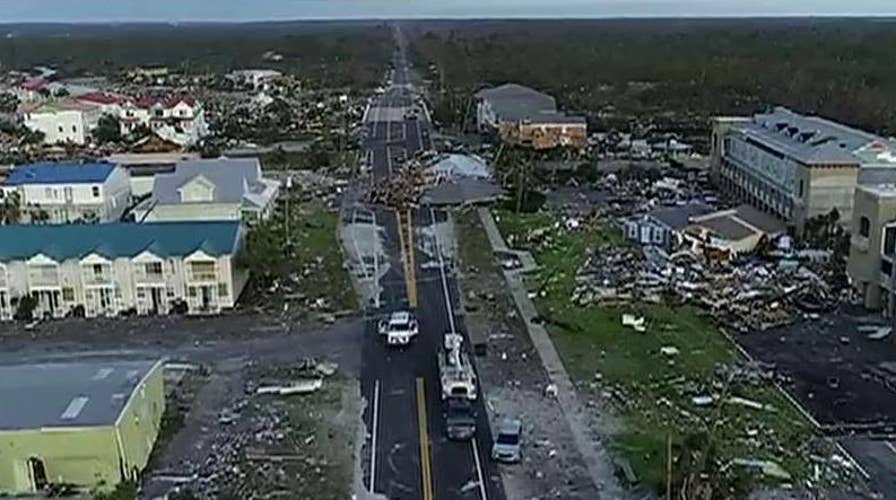Drone video shows damage to Mexico Beach, Florida
Hurricane Michael brings widespread damage and destruction to the Florida Panhandle; Mike Tobin reports.
About a million people remained in the dark Friday morning after Hurricane Michael left a trail of destruction that claimed at least six lives, flattened entire towns and "shattered" electrical grids.
The scenes were familiar across communities in Florida and Georgia: uprooted trees cracked like toothpicks, buildings with roofs peeled off, homes flattened into an unrecognizable landscape.
As dawn broke in Albany, Ga., residents arose to find trees sticking out of houses and blocking 100 intersections, local news station WRAL-TV reported.
Mexico Beach, Fla., looked as if a bomb had gone off as residents emerged to tally their losses. Twenty-three miles up the coast in Panama City, blocks of beachfront homes were obliterated and debris lay strewn aside overturned vehicles.
"We'll have to bulldoze and start over," Linda Marquardt, of Mexico Beach, said of her mud-filled home.
“It looks like an atomic bomb had hit our city,” David Barnes, of Panama City, told the Panama City News Herald. “Damage has been widespread.”
Former President Barack Obama, in a tweet, asked Americans to help rebuild. “America is always at our best when we look out for each other,” he wrote.
There were at least 6 confirmed fatalities, including a Florida man killed by a tree that crashed through his roof, a North Carolina man also struck by a fallen tree, and an 11-year-old Georgia girl who died when a carport rammed the family's modular home.
Assessments by Georgia's Department of Agriculture show incredible losses to the state’s crops, animals and infrastructure.
Georgia’s $23.3 billion poultry industry was hit hard after 84 chicken houses, estimated to have held more than 2 million chickens, were destroyed. Damaging winds annihilated much of the state’s cotton crop or tangled it, making it harder to extract clean lint during the ginning process.
Boston-based insurance company Karen Clark & Company is estimating Hurricane Michael caused about $8 billion in insured losses. Total damages from storm surge are estimated to be $3.7 billion, of which about ten percent will be insured.
Emergency management officials are urging residents to stay off the streets until utility crews and other service providers finish clearing away hazardous obstacles.
As of Thursday evening, more than 370,000 customers were without power in Florida and 202,000 customers in Virginia were in the dark. Nearly 500,000 customers were without power across the Carolinas as Michael swept through, the Raleigh News & Observer reported.
Meanwhile, Georgia Power reported to have restored electric to 234,000 customers across The Peach State by Thursday evening.
Florida Senator Marco Rubio said restoring power was going to be “long & difficult” as the storm “shredded” its electric grid. He expected it to take several days before crews could even get to work on bringing Floridians out of the dark due to the immense cleanup that needs to take place.
Officials estimate that it could take days or even weeks to restore power in some areas.
Rick Reichmuth, Fox News' chief meteorologist, said Michael was the fourth-most powerful storm to make landfall in the U.S. when measuring by wind, which topped out at 155 mph, and the third-most powerful in terms of pressure, at 919 mb.
Michael was the first storm of its magnitude to make landfall in the Panhandle since record-keeping there began in 1851.
Fox News’ Travis Fedschun and The Associated Press contributed to this report.











































